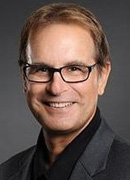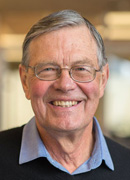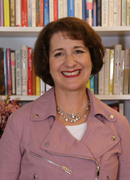Professor Donaldson works with students on a wide range of topics across several fields and programs at CGU, including evaluation theory and practice; the science of well-being and positive psychology; positive organizational and sports psychology; organizational behavior; positive organizational and human resource development; positive youth development and education; and community/global health program design, monitoring, and evaluation. As an immigrant born overseas and now a naturalized US citizen, Professor Donaldson has traveled extensively and especially enjoys working on cross-cultural and international topics with students who have diverse backgrounds and perspectives from all across the globe. He was recently honored with the International Positive Psychology Association (IPPA) Inspiring Mentor Career Achievement Award (2019) and appointed Faculty Advisor of the IPPA Student Division with approximately 600 student members from 50 different countries. From 2011-2017, he was director and faculty mentor for approximately 50 underrepresented minority graduate students from across more than 30 different universities participating in the American Evaluation Association’s esteemed and internationally recognized Graduate Education Diversity Internship (GEDI) Program. Professor Donaldson has served as chair or member on more than 100 doctoral dissertation committees at CGU since 1995, and more than 200 master’s theses and online certificate students’ culminating research and evaluation projects.
Donaldson previously provided more than 16 years of leadership and service to the School of Social Science, Policy, & Evaluation (SSSPE), where he was the founding dean from 2013 to 2017; the School of Community & Global Health (SCGH), where he was dean from 2013 to 2017; the School of Politics & Economics, where he was dean from 2012 to 2013; and the School of Behavioral & Organizational Sciences (SBOS), where he was dean from 2001 to 2013. Donaldson’s portfolio in the social and health sciences during the final three years of his concurrent deanships (2014-2017) included providing academic leadership for more than 100 core and supporting graduate faculty, overseeing the education of more than 650 degree-seeking graduate students, and securing grants, contracts, and gifts to support SSSPE and SCGH research and students. Among many other accomplishments, Donaldson led the effort to develop the first research-oriented positive psychology programs in the world, launch the new Doctor of Public Health program at CGU (DrPH), and dramatically expanded the portfolio of evaluation and applied research programs.
In 2007, Donaldson (in collaboration with professors Mihaly Csikszentmihalyi and Jeanne Nakamura) developed the first research-focused PhD and MA programs in positive psychology. He currently provides paid employment and supervises numerous students specializing in positive organizational psychology, positive health and sports psychology, and evaluation science. Many of his students are active in his Accenture Talent Innovation Lab, Positive Organizational Psychology Research Lab, Positive Organizational Development Lab, or Positive Sports & Peak Performance Psychology Lab. Professor Donaldson actively recruits new students to join his labs at the beginning of the fall, spring, and summer semesters.
Donaldson also employs and supervises doctoral, masters, and certificate students specializing in evaluation and applied research methods. Many of these students work with him on projects as part of the Claremont Evaluation Center (CEC) and his Culturally Responsive and International Theory-driven Evaluation Lab. The CEC is a major provider of evaluation and applied research services, on-site and online professional development training, and evaluation conferences and events, and it supports The Evaluators’ Institute (TEI), CGU evaluation certificate programs, the new online program in evaluation and applied research, and a wide variety of residential master’s and doctoral degree programs at CGU. Located on the university campus in Claremont, the CEC has in recent years expanded its presence in Washington DC to amplify its positive social impact.
Donaldson has built a career rich in both academic and professional experience. He is past president of the American Evaluation Association (2015) and has served on numerous boards, including those of the International Positive Psychology Association, Western Psychological Association, Western Positive Psychology Association (co-founder), American Evaluation Association, Centre for Program Evaluation at the University of Melbourne, The Faster Forward Fund, Southern California Evaluation Association (co-founder), and EvalPartners. He currently serves as editor of the Evaluation and Society book series (with Jennifer Greene), and as a member of the editorial boards of the International Journal of Applied Positive Psychology, American Journal of Evaluation, New Directions for Evaluation, Evaluation & Program Planning, and Journal of Multidisciplinary Evaluation. He is also a fellow and on the council of representatives for the Western Psychological Association.
Donaldson has been honored with a plethora of prestigious international, national, and regional career achievement awards, including the Early Career Achievement Awards from the American Evaluation Association (1996) and the Western Psychological Association (2001). In 2013, he was presented with the American Evaluation Association’s (AEA) Lifetime Achievement Award, one of the highest honors in the field of evaluation, and the Paul F. Lazarsfeld Evaluation Theory Award for sustained lifetime written contributions to the advancement of evaluation theory. “As an author and full-time evaluation professional, I have learned a great deal in preparing this justification statement,” wrote one of his lead nominators, “and I come away convinced that Stewart Donaldson is probably our field’s most prolific theorist.”
Donaldson was also honored with the AEA’s 2017 Robert Ingle Service Award for his important contributions to the field of evaluation and the American Evaluation Association (AEA) over a long period of time. That recognition includes his serving as president of the AEA during the International Year of Evaluation in 2015, for six years of recent AEA Board Service, as director of the AEA Graduate Education Diversity Internship Program, as chair of the Program Theory and Theory-Driven Evaluation Topical Interest Group, and for his various leadership appointments and many evaluation training, mentoring, evaluation practice, and scholarly contributions.
In 2018, The Western Psychological Association (WPA) bestowed upon Donaldson the prestigious WPA Social Responsibility Award for his efforts to promote and increase social justice at the societal and individual levels. The WPA award selection committee unanimously chose Donaldson based on his record of research and publications, theory-based evaluations, and grants that are oriented toward social equality and boosting positive psychological outcomes.
He was also selected as the recipient of the AEA’s Alva and Gunnar Myrdal Evaluation Practice Award in 2018, which is presented to an evaluator who exemplifies outstanding evaluation practice and whose contributions to the field of evaluation have been substantial, sustained over a number of years, cumulative, and whose work is consistent with the AEA Guiding Principles for Evaluators. Outstanding evaluation practice is defined as leading or conducting evaluations of the highest possible quality and utility, as demonstrated through publications, documented stakeholder feedback, and other forms of evidence of influencing the field in which evaluations are performed. His nomination letter stated “he has served the AEA and the broader field of evaluation as a major thought leader as well as a practitioner [who] has done more to create the conditions for practice excellence in the United States and around the world than any other person.”
Most recently at International Positive Psychology Association’s (IPPA) World Congress of Positive Psychology in Melbourne Australia (July 2019), Professor Donaldson was honored with two career achievement awards. The 2019 IPPA Work and Organizations Division “Exemplary Research to Practice Award” was presented to Donaldson for many years of exemplary research and teaching, as well as a robust cumulative contribution to evidence-based practice related to fostering positive work and organizations. He was also awarded the IPPA 2019 “Inspiring Mentor Award.” The student division of IPPA recognizes one outstanding mentor in the field of positive psychology who provides continued commitment and support to students that foster professional and academic development. Professor Donaldson was given this honor to acknowledge his many years of outstanding teaching and mentoring, and for inspiring the next generation of diverse psychological scientists to make meaningful contributions to societies across the globe.
Donaldson works collaboratively with his students and colleagues to publish findings from his extensive portfolio of extramurally funded research and evaluation projects. This work has been cited widely, including more than 200 peer-reviewed scientific articles, chapters, and evaluation reports. He has published or has forthcoming 18 books, including Positive Psychological Science: Improving Everyday Life, Health and Well-being, Work, Education, and Societies Across the Globe (forthcoming, 2020); Theory and research-driven evaluation science: Culturally responsive strategies and applications (forthcoming, 2020); Designing and evaluating positive organizational development interventions (forthcoming, 2020); Appreciative and Strengths-focused Evaluation (forthcoming, 2020); Toward a Positive Psychology of Relationships: New Directions in Theory and Research (2018); Scientific Advances in Positive Psychology (2017); Evaluation for an Equitable Society (2016); Credible and Actionable Evidence: The Foundation for Rigorous and Influential Evaluations (2015); Emerging Practices in International Development Evaluation (2013); The Future of Evaluation in Society: A Tribute to Michael Scriven (2013); Teaching Psychology Online: Tips and Techniques for Success (2012); Social Psychology and Evaluation (2011); Applied Positive Psychology: Improving Everyday Life, Health, Schools, Work, and Society (2011); Program Theory-Driven Evaluation Science: Strategies and Applications (2007); Applied Psychology: New Frontiers and Rewarding Careers (2006); and Evaluating Social Programs and Problems (2003).












